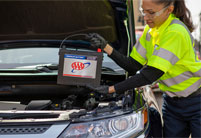Colonial Pipeline Update
Colonial Pipeline Update

On the week, the national gas price average jumped seven cents to $2.967. If the trend continues, it would make the national average the most expensive since November 2014 –the last time we saw average prices at $2.99 and higher.
AAA forecasts gas prices to climb this week in reaction to the shutdown of the Colonial Pipeline, which delivers approximately 45% of all fuel to the East Coast. Over the weekend, the Colonial Pipeline announced they were the victim of a cybersecurity attack and, as a precaution, shut down the pipeline, which runs from Texas to New York Harbor. At this time, some lateral lines have reopened, but there is no word of when the mainline, including the gasoline line, will be operational.
“This shutdown will have implications on both gasoline supply and prices, but the impact will vary regionally. Areas including Mississippi, Tennessee and the east coast from Georgia into Delaware are most likely to experience limited fuel availability and price increases, as early as this week,” said Jeanette McGee, AAA spokesperson. “These states may see prices increase three to seven cents this week.”
The longer the pipeline is offline, the larger the impact on the east coast. However, foreign gasoline imports and other pipelines can supplement Northeastern supply. Other areas of the country will see little impact.
While there is sufficient gasoline supply in the U.S. (235.8 million bbl), other pipelines and the Department of Transportation’s temporary hours-of-service exemption for tanker trucks transporting gasoline and other fuels, will be able to ease the strain, but not resolve the issues caused by the pipeline interruption. Once the pipeline is up and running, there could still be residual delays as it takes about 15–18 days for fuel to flow from Texas to New York.
AAA will continue to monitor the latest news concerning the Colonial Pipeline. In the meantime, we urge against panic-buying of gasoline.
Keep these tips in mind to conserve fuel:
- Plan ahead to accomplish multiple errands in one trip, and whenever possible avoid high-traffic times of day.
- If you own more than one car, use the most fuel-efficient model that meets the needs of any given journey.
- Remove unnecessary and bulky items from your car. Minimize your use of roof racks and remove special carriers when not in use. It takes more fuel to accelerate a heavier car, and the reduction in fuel economy is greater for small cars than for larger models.
- Minimize your use of air conditioning. Even at highway speeds, open windows have less effect on fuel economy than the engine power required to operate the air conditioning compressor.
- In hot weather, park in the shade or use a windshield sunscreen to lessen heat buildup inside the car. This reduces the need for air conditioning (and thus fuel) to cool down the car.
Motorists can benefit from comparing pump prices before filling up with the AAA Mobile App. Learn more at www.AAA.com/Mobile. AAA members receive discounts at gas stations such as Fastrac, Maple Leaf Market and Shell locations across the country. Learn more here.












